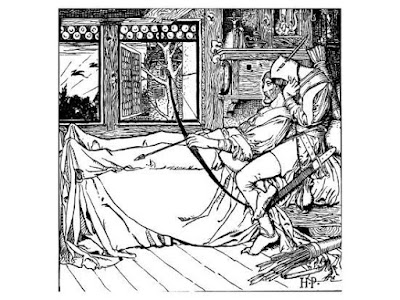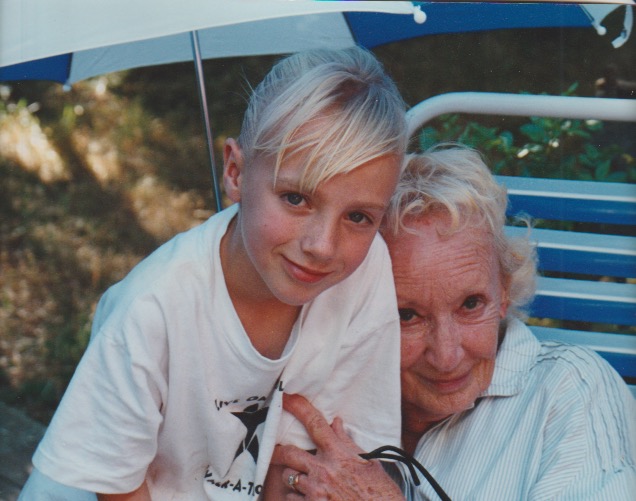ROBIN HOOD and OTHER OUTSIDERS
One year ago as the Center for Fiction First Novel Prize dinner in NYC approached, I was asked, along with the other six finalists for the prize, to write in response to this question: what was the first book you fell in love with? I thought immediately of this one. The article was published initially at LitHub, Dec. 2 2017.
& & & &
 |
| "Robin shooteth his last shaft" |
None of the books I read as a child have survived
to the present day. Late in her life my dear mother developed dementia and
became a hoarder; everything I once possessed in the house where I grew up was
carted to a toxic-waste dump by the county haz-mat crew. I suspect it would
have been difficult to pick a favorite even if the books had survived: my
sisters and I were voracious readers and were kept amply supplied by our Aunt
Helene, a book editor at the San Francisco Chronicle. Every Christmas she
shipped us -- her poor relations -- a box of reviewer's copies of fiction and
non-fiction titles, sometimes appropriate for children and sometimes less so. I
recall a biography of mad King Ludwig II of Bavaria, a collection of Arthur
Rackham's illustrations of wood sprites, and a how-to guide for making macramé
clothing, with which I entertained a mild obsession. (Is there anyone left who knows
what "macramé" is?...)
I don't know if The Merry Adventures of Robin Hood was a gift from our aunt or if
it had once been Daddy's own, but I suspect the latter. That's because we were
not allowed to treat it with anything less than careful, clean-handed
reverence. Our father was an artist: a creative misfit and traumatic brain
injury survivor. All his life he
maintained that his elder brother lured him on to the roof of Horace Mann
Elementary School to fly a kite with the express intention of killing him,
which was nearly the result. He
treasured his Scribner's edition with Howard Pyle's intricate engravings;
mostly what I remember from that book was the final illustration of a weakened Robin
propped up on a pillow, drawing his bow in order to "shooteth his last shaft" through the open window. I
pored over that picture, marveling at its tragic implications. That was my
introduction to metaphor.
My father, while not comfortable in a traditional
parenting role, nevertheless took pleasure in outfitting our childhoods with sublime
props. He built a Sioux-style teepee large enough to accommodate us and our
sleeping bags in the backyard on starlit nights, and during our Robin Hood
period, crafted four beautiful bows and arrows by hand out of ash-wood, our
names tooled on the grips. I would give anything to hold my bow in my hands
today and "shooteth a shaft," but the bows went to the dump along
with the books, the teepee and the macramé vests.
The story of Robin's merry band of men robbing the
rich and giving to the poor is well-known; however, what I absorbed in powerfully
affirming terms from this tale was not so much the noble aims of the band and
its leader as much as their existence as outsiders, living in the woods far
from the long arm of Nottingham's authority and its conventions. This was a state
I could relate to, as did my sisters, and we clung to Robin Hood's alternate
reality in order that, by identifying with outsiders, we felt less like outcasts.
We were strange children, isolated by the circumstances of our parents'
complicated relationships with their own families, their bizarre ideologies,
and their decision to settle on a former cattle ranch in a house my father
designed, where coyotes howled outside our windows at night and rattlesnakes occasionally
curled up beneath our baseboard heaters. And then, regrettably, I wore those macramé
creations to school, along with the lederhosen
I acquired during my Heidi craze. Even without the lederhosen, classmates who
heard me speak aloud asked me "what country do you come from?" Not surprisingly, my best friend in high
school was the librarian, a wild Alabamian who once put a loaded Colt revolver
in my hands and taught me to shoot the shit out of a Jeffrey pine. In her own
way, I believe, she was teaching me that being strange might one day prove to
be my salvation.
Growing up as an outsider has its advantages. When
my husband and I decided to move to North Carolina from San Francisco two
decades ago, everyone we knew told us we were crazy. (Years before, some of the
same people told us we were crazy to marry each other.) But if you are not
bound by convention, you are more willing to take risks. In my novel The Second Mrs. Hockaday, the protagonist Placidia
Hockaday is asked to explain why she married Major Hockaday after knowing him
for only two days, taking on the care of his child and his farm while the Civil
War raged, stepping blithely into the abyss of the unknown. She replies to her
cousin: "life is all about the
leaps."
So it has been for me: an outsider still, but ready
to leap, not knowing where I'll land.
& &
& &
The Merry Adventures of Robin Hood, adapted and illustrated by Howard Pyle, can be ordered online from a variety of sources.



Comments
Post a Comment
Thanks for dropping by!